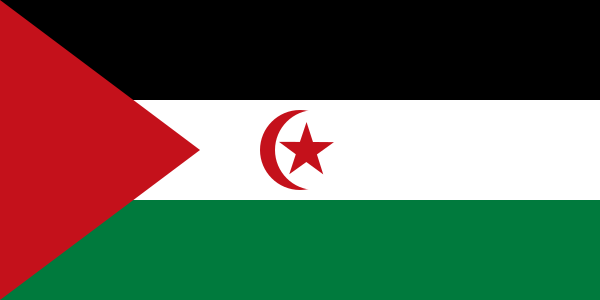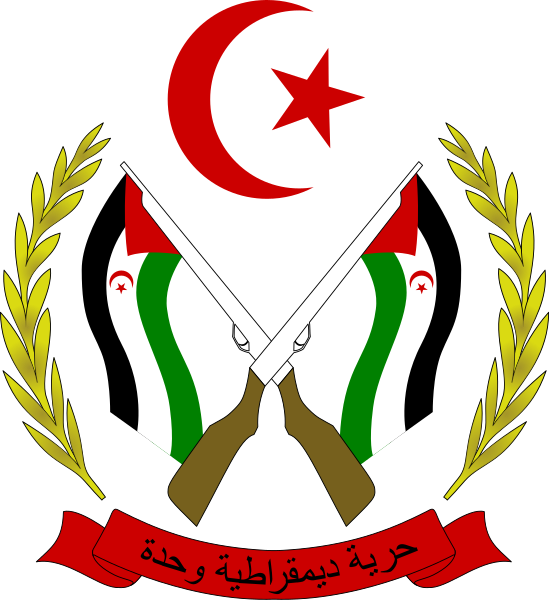Sahrawi Arab Democratic Republic / الجمهورية العربية الصحراوية الديمقراطية (Arabic) /Al-Jumhūrīyya Al-`Arabīyya Aṣ-Ṣaḥrāwīyya Ad-Dīmuqrāṭīyya / República Árabe Saharaui Democrática
.svg/550px-Sahrawi_Arab_Democratic_Republic_(orthographic_projection).svg.png) |
| World Map Location |
The Sahrawi Arab Democratic Republic (SADR) (Arabic: الجمهورية العربية الصحراوية الديمقراطية Al-Jumhūrīyyah Al-`Arabīyyah Aṣ-Ṣaḥrāwīyyah Ad-Dīmuqrāṭīyyah, Spanish: República Árabe Saharaui Democrática) is a partially recognised state that claims sovereignty over the entire territory of Western Sahara, a former Spanish colony. SADR was proclaimed by the Polisario Front on February 27, 1976, in Bir Lehlou, Western Sahara. The SADR government controls about 20–25% of the territory it claims. It calls the territories under its control the Liberated Territories or the Free Zone. Morocco controls and administers the rest of the disputed territory and calls these lands its Southern Provinces. The SADR government considers the Moroccan-held territory to be occupied territory, while Morocco considers the much smaller SADR-held territory to be a buffer zone.
History
Main article: History of Western SaharaFollowing the Spanish evacuation of Spanish Sahara, Spain, Morocco, and Mauritania signed the Madrid Accords on November 14, 1975, leading to both Morocco and Mauritania moving in to annex the territory of Western Sahara. Neither state gained international recognition and war ensued with the independence-seeking Polisario Front, claiming to represent the Sahrawi people. The creation of the Sahrawi Arab Democratic Republic was announced in Bir Lehlou in Western Sahara on February 27, 1976, as the Polisario declared the need for a new entity to fill what they considered a political void left by the departing Spanish colonisers. Bir Lehlou remained in Polisario-held territory under the 1991 cease-fire (see Settlement Plan) and has remained the government in exile's symbolic capital of the exiled republic, while Polisario continues to claim the Moroccan-controlled city of El Aaiún, as its capital. Day-to-day business, however, is conducted in the Tindouf refugee camps in Algeria, which house most of the Sahrawi exile community.
Constitution
Main article: Constitution of the Sahrawi Arab Democratic RepublicA new 1999 Constitution of the Sahrawi Arab Democratic Republic took a form similar to the parliamentary constitutions of many European states, but with some paragraphs suspended until the achievement of "full independence". Among key points, the head of state is constitutionally the Secretary General of the Polisario Front during what is referred to as the "pre-independence phase," with provision in the constitution that on independence, Polisario is supposed to be dismantled or separated completely from the government structure. Provisions are detailed for a transitory phase beginning with independence, in which the present SADR is supposed to act as Western Sahara's government, ending with a constitutional reform and eventual establishment of a state along the lines specified in the constitution.
The broad guidelines laid down for an eventual Western Saharan state in the constitution include eventual multi-party democracy with a market economy. The constitution also defines Sahrawis as a Muslim, African and Arab people, The Constitution also declares a commitment to the principles of human rights and to the concept of a Greater Maghreb, as a regional variant of Pan-Arabism.
Government structure
The highest office of the republic is the President of the Sahrawi Arab Democratic Republic, now Mohamed Abdelaziz, who appoints the Prime Minister, now Abdelkader Taleb Oumar. The SADR's government structure consists of a Council of Ministers (a cabinet led by the Prime Minister), a judicial branch (with judges appointed by the President) and the parliamentary Sahrawi National Council (SNC, present speaker is Kathri Aduh). Since its inception in 1976, the various constitutional revisions has transformed the republic from an ad hoc managerial structure into something approaching an actual governing apparatus. From the late 1980s the parliament began to take steps to institute a division of powers and disentangle the republic's structures from those of the Polisario party, although without clear effect to date.
Its various ministries are responsible for a variety of services and functions. The judiciary, complete with trial courts, appeals courts and a supreme court, operates in the same areas. As a government-in-exile, many branches of government do not fully function, and has affected the constitutional roles of the institutions. Institutions parallel to government structures also have arisen within the Polisario Front, which is fused with the SADR's governing apparatus, and with operational competences overlapping between these party and governmental institutions and offices.
The SNC is weak in its legislative role, having been instituted as a mainly consultative and consensus-building institution, but it has strengthened its theoretical legislative and controlling powers during later constitutional revisions. Among other things, it has added a ban on the death penalty to the constitution, and brought down the government in 1999 through a vote of no-confidence.
The composition of the Sahrawi National Council is as follows:
Area of authority
The SADR acts as a government administration in the Sahrawi refugee camps located in the Tindouf Province of western Algeria. It is headquartered in Camp Rabouni, south of Tindouf, although some official events have taken place on Western Saharan territory in the provisional capital of Bir Lehlou, in Tifariti and other towns in the Liberated Territories. The government of the SADR administers both the Western Sahara territories under its control and the Sahrawi refugee camps on Algerian soil near Tindouf, but only claims sovereignty on the first ones. Several foreign aid agencies, including the UNHCR, and NGOs are continually active in the camps.
International recognition and membership
Main articles: Political status of Western Sahara, International recognition of the Sahrawi Arab Democratic Republic, and Foreign relations of the Sahrawi Arab Democratic RepublicAs of 2014, the Sahrawi Arab Democratic Republic has been recognized by 85 states. Of these, 39 have since "frozen" or "withdrawn" recognition for a number of reasons. A total of 40 states currently maintains diplomatic relations with the SADR. Sahrawi embassies exist in 18 states.
Although it is not recognised by the United Nations, the SADR has held full membership of the African Union (AU, formerly the Organisation of African Unity, OAU) since 1984. Morocco withdrew from the OAU in protest and remains the only African nation not within the AU since South Africa's admittance in 1994. The SADR participates as guest on meetings of the Non-Aligned Movement or the New Asian–African Strategic Partnership, over Moroccan objections to SADR participation. On the other hand, Morocco's claim to Western Sahara is supported by the Arab League.
The SADR also participated in a conference of the Permanent Conference of Political Parties of the Latin American and the Caribbean (COPPPAL), 2006, the SADR ambassador to Nicaragua participated in the opening conference of the Central American Parliament, 2010, and SADR delegation participated in meeting of COPPPAL and International Conference of Asian Political Parties in Mexico City, 2012.
On 27 February 2011, the 35th anniversary of the proclamation of SADR was held in Tifariti, Western Sahara. Delegations, including parliamentarians, ambassadors, NGOs and activists from many countries participated in this event.
The SADR is not a member of the Arab League, nor of the Arab Maghreb Union, both of which include Morocco as a full member.
Proposed Western Sahara Authority
The Baker Plan created by James Baker, former UN Secretary-General Kofi Annan's personal envoy to Western Sahara, the SADR would have been replaced with a five-year transitional Western Sahara Authority (WSA), a non-sovereign autonomous region supervised by Morocco, to be followed by a referendum on independence. It was endorsed by the UN in 2003. However, as Morocco has declined to participate, the plan appears dead.
In April 2007, the government of Morocco suggested that a self-governing entity, through the Royal Advisory Council for Saharan Affairs (CORCAS), should govern the territory with some degree of autonomy for Western Sahara. The project was presented to the United Nations Security Council in mid-April 2007. A stalemate over the Moroccan proposal led the UN in an April 2007 "Report of the UN Secretary-General" to ask the parties to enter into direct and unconditional negotiations to reach a mutually accepted political solution.













0 comments:
Post a Comment